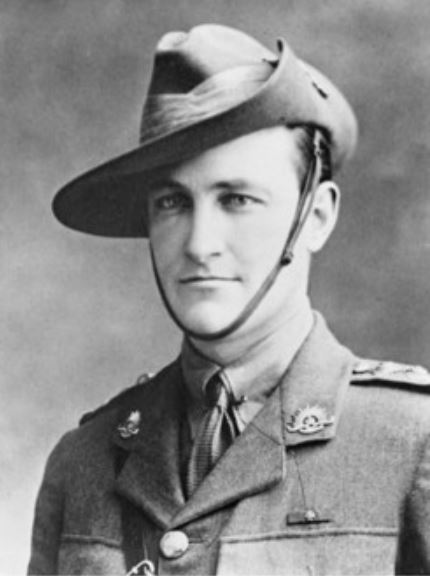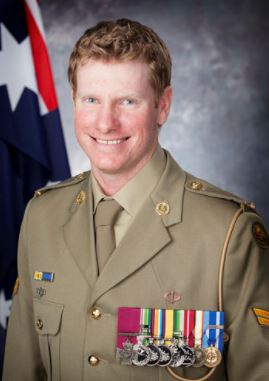Lieutenant Colonel William Donovan Joynt VC (1889 - 1986, 96yo)
 William Joynt was born on 19 March 1889 in Elsternwick, Victoria. After finishing school, he worked in clerical roles before venturing to North Queensland in 1909, where he took on various bush and farming jobs. He had prior military experience with the Victorian Rifles Militia before enlisting in the Australian Imperial Force on 21 May 1915. He received his commission as an officer later that year.
William Joynt was born on 19 March 1889 in Elsternwick, Victoria. After finishing school, he worked in clerical roles before venturing to North Queensland in 1909, where he took on various bush and farming jobs. He had prior military experience with the Victorian Rifles Militia before enlisting in the Australian Imperial Force on 21 May 1915. He received his commission as an officer later that year.
In mid-1916, Joynt joined the 8th Battalion on the Western Front and was wounded in September during a trench raid at The Bluff, near Ypres. After recovering in England, he rejoined his unit and took part in major battles including Bullecourt, Menin Road, and Broodseinde. On 23 August 1918, near Herleville, his company came under heavy enemy fire while advancing on Plateau Wood. With the attack faltering, Joynt rallied the men and led a charge that cleared the approaches and captured the wood along with over 80 prisoners. For this display of outstanding leadership and bravery, he was awarded the Victoria Cross. Just days later, he was seriously wounded again.
Following recovery, he was promoted to Captain and posted to AIF Headquarters in London before returning home in early 1920. His appointment ended in June that year. After the war, Joynt remained active in veterans’ affairs. He helped found Melbourne Legacy and played a key role in advocating for the construction of the Shrine of Remembrance.
Joynt also maintained military involvement between the wars, eventually attaining the rank of Major. He returned to full-time service in 1939, commanding the 3rd Garrison Battalion and later overseeing training camps at Puckapunyal and Seymour during the Second World War. He retired from the army in 1944 with the honorary rank of Lieutenant Colonel.
He lived a long life devoted to public service and remembrance. William Joynt died on 5 May 1986 and was buried with full military honours at Brighton Cemetery in Melbourne.
Corporal Daniel Alan Keighran VC

Daniel Keighran was born on 18 June 1983 in Nambour, Queensland. Shortly after finishing school, he enlisted in the Australian Army on 5 December 2000. Before turning 18, he had completed his initial training and joined the 6th Battalion, Royal Australian Regiment (6RAR).
His early career included overseas service with Rifle Company Butterworth in Malaysia and deployment to East Timor in 2003–04 under Operation Citadel. A second stint in Malaysia followed in 2004. Promoted to Lance Corporal in 2005, Keighran transferred to Support Company as part of the Mortar Platoon. In 2006, he deployed to Iraq as a Bushmaster protected mobility vehicle driver on Operation Catalyst, a role he reprised during his 2007 deployment to Afghanistan with the Special Operations Task Group under Operation Slipper.
Returning to 6RAR in 2009 as a Corporal with Delta Company, Keighran deployed once again to Afghanistan in early 2010. During an intense engagement on 24 August 2010, his patrol came under sustained fire from a well-coordinated insurgent force. Realising the urgency of the situation, Keighran repeatedly moved into exposed positions under heavy enemy fire to identify enemy locations and direct suppressive fire. His willingness to put himself in harm’s way ensured accurate targeting by Australian and Afghan machine gunners, helping to shift momentum back in favour of the patrol.
Throughout the prolonged firefight, Keighran continued to move across the ridgeline, guiding support fire from both ground forces and Australian Light Armoured Vehicles. At one point, he crossed over 100 metres of open terrain under intense fire to reposition the patrol’s joint fires controller. On four separate occasions, he exposed himself to locate enemy strongpoints. When an Australian soldier was wounded, Keighran again moved into the open to divert enemy fire, enabling the casualty to be treated and evacuated.
His repeated acts of extraordinary bravery in life-threatening conditions were key to the survival and withdrawal of his patrol. For his gallantry, Keighran was awarded the Victoria Cross for Australia — the nation’s highest military honour.
Following his discharge from full-time military service in 2011, Keighran transitioned to the private sector and remains active in supporting veteran causes.
Last Reviewed 06/2025









